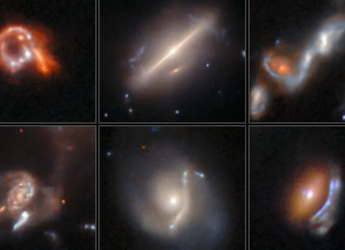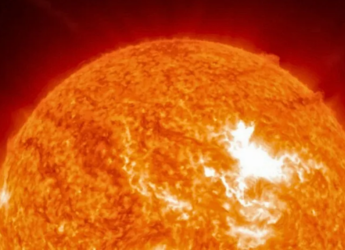- Home
- Science
- Science News
- Sun Erupts with Triple Solar Flares After Weeks of Silence
Sun Erupts with Triple Solar Flares After Weeks of Silence
After a 22-day lull, sunspot AR 4168 unleashed three M-class flares on Aug. 3–4. They may cause brief radio blackouts and auroras from glancing CMEs.

Photo Credit: NASA / SDO and the AIA, EVE, and HMI science teams, helioviewer.org
Minor solar flares cause brief radio blackouts, no major impact
After three weeks of calm, the Sun roared back to life on Aug. 3–4, 2025, unleashing three moderate M-class solar flares in just 24 hours. These midday flares – including a 2.9-M flare on Aug. 3 and two more (M2.0 and M1.4) on Aug. 4, all erupted from sunspot region AR 4168. While not as intense as the largest X-class events, M-class flares are still powerful bursts of radiation capable of briefly disturbing Earth's upper atmosphere. Experts say we may see minor effects, such as short-lived radio blackouts or a brush of auroras at high latitudes.
Solar Eruptions Ignite
According to space weather website SolarHam.com's post on X, the flares marked a sudden end to a 22-day quiet spell on the Sun. Sunspot AR 4168, a magnetically complex region, rapidly grew active and unleashed the chain of flares. According to Space.com, the M2.9 flare at 10:01 a.m. EDT on Aug. 3 was the first moderate flare since mid-July, and it was followed by M2.0 and M1.4 flares on Aug. 4.
Each flare released intense X-rays and ultraviolet light.
M-class flares are ten times more energetic than the more common C-class flares, although far weaker than the most extreme X-class eruptions. Scientists noted that these eruptions likely hurled two coronal mass ejections (CMEs) into space, which are huge clouds of charged particles that can impact Earth if they arrive.
Potential Earth Effects
Scientists say these eruptions should have only minor impacts on Earth. By NOAA's space-weather scale, M1–M4 flares correspond to R1–R2 (minor) radio blackouts, so any HF radio outages would be weak and brief. Satellite communications and power grids are expected to be unaffected.
However, the ejected CMEs may still skim past Earth.
EarthSky reports a possible glancing blow around Aug. 5–6, which could trigger a minor G1 geomagnetic storm. That could briefly light up auroras at high latitudes (for example, far-northern Europe or Canada). So far models suggest only a small chance of impact. In other words, NOAA forecasters classify this as a minor event, unlikely to cause disruptions.
Get your daily dose of tech news, reviews, and insights, in under 80 characters on Gadgets 360 Turbo. Connect with fellow tech lovers on our Forum. Follow us on X, Facebook, WhatsApp, Threads and Google News for instant updates. Catch all the action on our YouTube channel.
Related Stories
- Samsung Galaxy Unpacked 2025
- ChatGPT
- Redmi Note 14 Pro+
- iPhone 16
- Apple Vision Pro
- Oneplus 12
- OnePlus Nord CE 3 Lite 5G
- iPhone 13
- Xiaomi 14 Pro
- Oppo Find N3
- Tecno Spark Go (2023)
- Realme V30
- Best Phones Under 25000
- Samsung Galaxy S24 Series
- Cryptocurrency
- iQoo 12
- Samsung Galaxy S24 Ultra
- Giottus
- Samsung Galaxy Z Flip 5
- Apple 'Scary Fast'
- Housefull 5
- GoPro Hero 12 Black Review
- Invincible Season 2
- JioGlass
- HD Ready TV
- Laptop Under 50000
- Smartwatch Under 10000
- Latest Mobile Phones
- Compare Phones
- OPPO A6v 5G
- OPPO A6i+ 5G
- Realme 16 5G
- Redmi Turbo 5
- Redmi Turbo 5 Max
- Moto G77
- Moto G67
- Realme P4 Power 5G
- HP HyperX Omen 15
- Acer Chromebook 311 (2026)
- Lenovo Idea Tab Plus
- Realme Pad 3
- HMD Watch P1
- HMD Watch X1
- Haier H5E Series
- Acerpure Nitro Z Series 100-inch QLED TV
- Asus ROG Ally
- Nintendo Switch Lite
- Haier 1.6 Ton 5 Star Inverter Split AC (HSU19G-MZAID5BN-INV)
- Haier 1.6 Ton 5 Star Inverter Split AC (HSU19G-MZAIM5BN-INV)

















